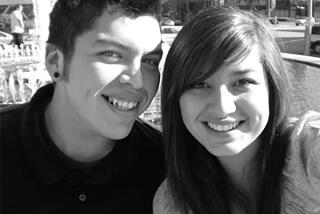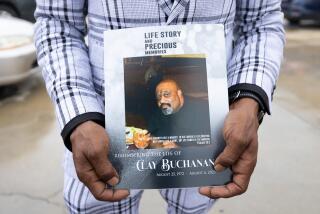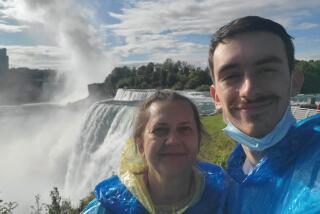Ezell Ford mourners say farewell and call for justice
On a breezy Saturday morning in southwest Los Angeles, they came by the hundreds to lay Ezell Ford to rest and to protest the fatal shooting by police of an unarmed black man struggling with mental illness.
“This is the breaking point,” Maurice Bull, 46, one of Ford’s cousins, said outside the funeral service at First African Methodist Episcopal Church, the city’s oldest black pulpit. “It’s got to stop.”
----------
FOR THE RECORD: Mark Ridley-Thomas: An article in Sunday, Aug. 31, California section identified Mark Ridley-Thomas as a Los Angeles city councilman. He is a member of the Los Angeles County Board of Supervisors.
----------
Conflicting accounts have emerged about the Aug. 11 killing of Ford, 25, who family said had been diagnosed with bipolar schizophrenia.
Police say he reached for an officer’s gun, prompting his partner to open fire. A friend of Ford’s family told The Times that she witnessed part of the encounter and saw no struggle.
A lawyer representing the two veteran officers involved in the incident has cautioned against judging their actions until the LAPD’s investigation is complete.
The funeral program described Ford as the life of the party in his younger years, who after the onset of mental illness became a “drifter” who walked the neighborhood “endlessly,” asking for cigarettes.
“The cop that killed him, he knows all of the kids over there,” said Lakisha Cardy, 39, who said her children grew up with Ford.
Before the viewing, several dozen family members held hands in a circle, dressed all in white, at the request of Ezell’s mother, Tritobia L. Ford, who wore a snowy satin suit.
“You are an example for the rest of the country. They want to see you act up,” the Rev. Eduardo Vickers told the group to murmurs of “yes” and “absolutely.” “This is a day of peace.”
One young man broke down over the rose- and chrysanthemum-adorned white casket where Ford lay in a double-breasted mustard-colored suit and tan fedora. He was led away sobbing as a relative fanned him with her funeral program.
After the casket was closed, the family was led back in for the service by a lone trumpeter playing “Amazing Grace.”
The tone was anything but conciliatory. Speaker after speaker linked Ford’s death to other violent encounters between police and unarmed black men, including Michael Brown, whose shooting death set off days of chaotic protests in Ferguson, Mo., and a national debate about police conduct and race relations. Brown was shot two days before Ford.
With Ford’s “passing, it is time for a national conversation,” retired Rep. Diane Watson told the mourners, to rousing applause.
Watson lined up at the pulpit with much of the city’s African American political establishment, including Rep. Maxine Waters (D-Los Angeles), City Councilmen Mark Ridley-Thomas and Curren Price and the Rev. Cecil “Chip” Murray, First AME’s former pastor, who came out of retirement to give the eulogy.
It was a déjà vu moment. In 1992, Murray took a lead role in denouncing the violence in the aftermath of the riots sparked by the acquittal of four police officers in the Rodney King beating. But he insisted the blame should rest not just with looters, but with the policies and politicians that have failed poor communities.
Taking the pulpit at Ford’s service, Murray said the Los Angeles Police Department had improved under the last three police chiefs, but “we still have a long way to go.”
“America, oh, America, you’re getting richer, but are you now getting a little old for this?” Murray said.
“We are on trial,” he said. “The nation, the world, are watching to see what we do.”
He again urged nonviolence but added: “We challenge our law enforcement people, those who are supposed to be our protectors, we challenge you to protect, to walk the walk instead of talking the walk.”
Waters said she feared that all young black men, especially those with special needs, could walk out the door and never come back after confrontations with the police.
“They will say you must be peaceful, you must be quiet,” she said. “Well, I’m here to say there is anger. There is frustration.”
A declaration by Nation of Islam minister Tony Muhammad that Ford “didn’t pass, he was murdered,” was met with thunderous applause.
A dance group and several singers performed during the service, including Scherrie Payne, a member of one of the Supremes lineups, and Ellis Hall, also known as the “Ambassador of Soul.” Ford’s mother stood and swayed to the music or clapped along.
Ryan Coogler, director of “Fruitvale Station,” a movie about the fatal shooting of Oscar Grant by a BART police officer in Oakland in 2009, briefly joined the politicians up front. Eddie Levert, lead singer of the O’Jays, whose son died in a Cleveland jail in 2008 after being denied medication, said a few words. Steven Lerman, Rodney King’s attorney, is now representing the Ford family and also attended the service.
One of Ford’s five brothers interjected a personal note, telling how Ezell let him on the basketball court even though he was small. “I love you first, bro,” he said.
After the service, several mourners said they are waiting for law enforcement to act.
“We’re going to get justice, and that’s for the people who did this to be charged,” said Tony McKinstry, 37, one of Ford’s cousins. “It’s time for many people to do their jobs.”
More to Read
Start your day right
Sign up for Essential California for news, features and recommendations from the L.A. Times and beyond in your inbox six days a week.
You may occasionally receive promotional content from the Los Angeles Times.







